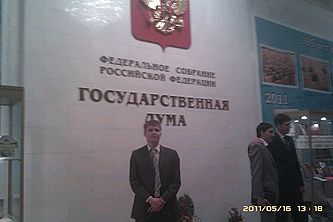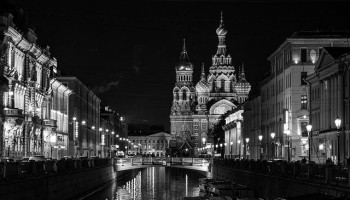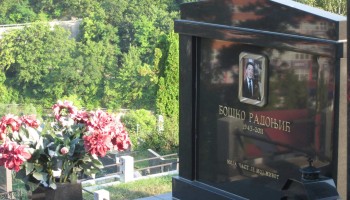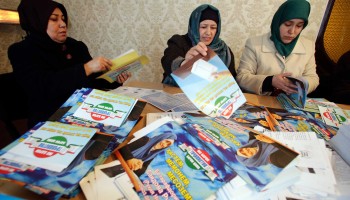Fisman of Columbia and Miguel of UC-Berkeley, respectively, compiled parking ticket data from 1997-2006 to determine which countries had the most violations per U.N. diplomat. Their idea is that every country has an equal opportunity to violate the laws, but not all chose to do so as a result of differing cultural norms. Therefore, countries who put no consequences on top officials who ignore U.S. laws may also be complacent when it comes to rooting out corruption at home. Moreover, officials simply may see nothing wrong with seeking special privileges for themselves.
Fishman and Miguel concluded that the diplomats, who accrued $18 million in fines they would never have to pay, “bring the social norms or corruption culture of their home countries with them.”
In the study, Kuwait was the biggest offender, with 246 violations per diplomat. Transparency International ranks the oil-rich country a respectable 54 out of 178 countries. But after Kuwait, the next group of countries on the list are poster children for corruption. Mubarak’s Egypt ranked second in parking tickets and the country ranked 98 in corruption followed by Chad (171), Sudan (172), and Bulgaria (71). .
Twenty one countries can boast no violations, including the United Kingdom, Canada, Japan. The authors found that some cultural factors played in, which they use to explain why several corrupt countries did not accrue any tickets: Burkina Faso (3.1), Azerbaijan 2.4), the Central African Republic (2.1), and Panama (3.6).
Fishman and Miguel also found that the higher the anti-American sentiment of a diplomat’s home country, the higher the amount of tickets he or she received. Albania, with 85 tickets per diplomat, must be an exception, as even George Bush remains popular there. The economists also noted a brief show of universal solidarity following the September 11, 2001 attacks on the World Trade Center, when parking tickets dropped drastically.
Russian Student Loses Internship for Exposing Corruption in his Blog
A Russian University student wrote a scathing blog post about his first—and last—week interning at the State Duma, translated by Novaya Gazeta. He detailed representatives’ illegal and extravagant travel expenditures and the modus operandi during session:
WTF?!?!?!?!? That deputies are f@#k ups is nothing new, but LIKE THIS….I’d never seen anything like it before. The hall is less than a quarter full, and those present are busy doing anything but taking part in the session and lawmaking. Everyone is walking around the hall, chatting each other up, some are reading newspapers; those in the back rows are actually playing cards. United Russia members play with their iPads. An atmosphere of f*&k it all and couldn’t give a rat’s a#$ reigns, even in chairman [Oleg] Morozov’s seat. He just reads something in depressing voice and that’s it. At the necessary moment at his command everyone returns to their seats and presses their buttons and then go on with their business again. Oh yeah, you all say Putin and Medvedev are in charge of the country and make all the decisions… F@#k that!

Yevgeny’s post was taken down and he not only lost his internship faster than you can say “pirogi,” but officials at his university who assisted with his internship placement are facing disciplinary action.
Bulgaria and Romania Not Likely to Enter Schengen in 2012
European Commission spokesman Mark Gray for the said it does not look likely that the EC monitoring system, the Cooperation and Verification Mechanism (CVM), will be lifted next year when it is up for renewal.
"It would depend on the significant progress of Bulgaria and Romania," Gray said in a briefing. Analysts do not think it looks likely.
The comments come after the annual progress report for Bulgaria and Romania was published on Wednesday.
The report says more progress has been made in Romania than in Bulgaria, but that both countries need to implement important anti-corruption reforms and make progress in the fight against organized crime. Until these are implemented, the countries cannot join Schengen and the EC will keep the CVM in place.
The EC also highlighted pervasive corruption in Romania’s education system as problematic.
One research institute, the Center for Study of Democracy, estimates that Bulgaria’s drug market is worth about $124 million a year and its internal sex trade about $168 million a year, while the profit from cigarette smuggling is about $436 million per year, as reported this week in an NYT profile on organized crime in Bulgaria.
European officials ignored the fact that Bulgaria and Romania have suffered from endemic corruption for decades. They thought they could straighten them out in a few years once they got them in Europe. They were wrong. They clearly don’t understand the problem and they don’t have a clue how to fix it. Expect this to go on for years to come.
Wiki-Leaks this week released two previously classified U.S. State Department cables detailing Bulgaria’s growing willingness to combat organized crime. They were released just after Bulgaria’s efforts to combat corruption were assessed by the EC report.
The first, a July 2009 dispatch, titled “New Hope in Bulgaria’s Fight Against Organized Crime” discusses a renewed impetus on the part of the government to arrest and prosecute organized criminals and get young, reform-minded people in government positions:
As one of his first acts in office, Tsvetanov fired Deputy Police Commissioner General Minko Braykov (the number two position in the national police hierarchy) who he believed had been connected with leaks of sensitive information and political interference in investigations. Tsvetanov emphasized that the new Deputy Commissioner General and his Deputy Ministers would be selected from a pool of younger, reform-minded thinkers with international experience, and he would not recycle old faces from previous administrations.
Then-Ambassador Nancy McEldowney also said Bulgaria planned to introduce reforms outlined by the U.S. Embassy:
4. (S) Aware that tackling organized crime and corruption cases will require resources outside of MOI, Tsvetanov said he will make improved interagency coordination a priority, and has already taken steps to initiate a multi-agency organized crime task force along lines suggested by the embassy. Particularly, he said his office will strive to improve coordination with the Ministry of Justice and the Prosecutor General. He stressed that cooperation between the U.S. and Bulgaria on narcotics and money laundering is already strong, but he hoped it would continue to grow.
“Bulgarian Government Makes Historic OC Bust,” published February 2010, details the arrest of 13 high-profile gangsters previously thought untouchable, including Alexei “the Tractor” Petrov, profiled in the recent NYT article linked above.
According to police, Petrov’s group has been in operation for over 10 years and has used intimidation and blackmail to acquire ownership of legitimate businesses. Petrov has controlling interest in the largest taxi company in Sofia (TAXIS EXPRESS) and is an “advisor” to one of the three largest insurance companies in Bulgaria (LEVSKI SPARTAK INSURANCE aka LEVINS), receiving a large share of its profit each year without clear responsibilities. Petrov also owns a stake in the tabloid newspaper “Weekend” and is the founder of a second, “Galleria.”
Petrov was arrested during investigations dubbed “Operation Octopus,” a crackdown on organized crime so-named because of the perception that the tentacles of organized crime control of so much of the city.
Petrov spent 6 months in prison and another six under house arrest. Now, he is talking about running for political office. He says he has become more famous as a result of Operation Octopus.
“I asked [Prime Minister] Borisov as early as the fall of 2009 to stop playing a police officer and focus on the economy. And now we live in a police state while the economy is on the brink of a disaster,”.he told Bulgarian media.
Given the corruption still rampant in Bulgaria, it is no surprise that organized crime thinks it should run for office.
VALERIE HOPKINS





